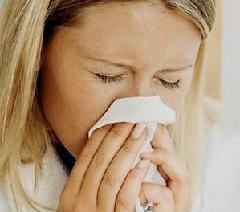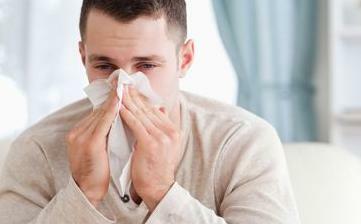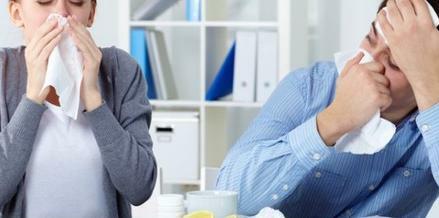 Rhinitis or runny nose is called the inflammatory process of the nasal cavity. Often, rhinitis is only a symptom of the disease. So, for example, the common cold can appear both in viral infection and in bacterial and even be a consequence of mechanical irritation.
Rhinitis or runny nose is called the inflammatory process of the nasal cavity. Often, rhinitis is only a symptom of the disease. So, for example, the common cold can appear both in viral infection and in bacterial and even be a consequence of mechanical irritation.
In addition, rhinitis is divided into acute and chronic. Its causes can be both viral, fungal, bacterial infections, and weakening of the immune system, and hypothermia in the cool season.
A very important role in the progress of the disease is played by lifestyle, predisposition to allergies and hereditary diseases. If the time is not given importance to the treatment of rhinitis, then in the future this disease can lead to complications or the transition of the disease to a chronic form, the therapy of which will take a long time.
In this article, we will look at the characteristics of rhinitis in adults, its symptoms and topical methods of treatment at home.
Causes of
Why does rhinitis occur, and what is it? The main cause of the disease with acute rhinitis is the result of penetration into the nasal passages of bacterial or viral infection. Also, rhinitis is a frequent companion of such severe infectious diseases as measles, diphtheria, scarlet fever and influenza.
The causes of rhinitis of non-infectious etiology can be:- Long-term residence in ecologically unfavorable conditions;
- Harmful working conditions;
- Vegetosovascular dystonia;
- Endocrine diseases;
- Cysts, polyps of the nose;
- Circulatory disorders( generalized or localized);
- Diseases of the kidneys, liver, lungs;
- Heart defects, myocarditis;
- Mechanical burn of the nasal mucosa;
- Allergic reactions of the body( cold allergy, sensitization in response to penetration of gases, vapors, pollen, animal wool, the general reaction of the body to the introduction of drugs or food);
- Other diseases of the cavity of the oropharynx and sinuses of the nose( sinusitis, adenoiditis, frontal sinusitis, etc.).
Experts associate the emergence of allergic rhinitis primarily with the individual features of the nasal mucosa in some people. In particular, with excessive sensitivity to various stimuli, so-called.exogenous allergens. Also, the causes of allergic rhinitis include increased sensitization to viral and bacterial infections.

Symptoms of rhinitis
Depending on the type and stage of rhinitis, the symptomatology can range from dry irritation in the nasal cavity to serous and mucopurulent discharge with bloody inclusions. In chronic rhinitis, headache, drowsiness, fast fatigue, decreased sleep quality, sometimes accompanied by snoring, are often observed.
The main symptoms of acute rhinitis in adults are:
- loss of ability to breathe freely through the nose;
- rapid sneezing;
- stuffiness of the ears;
- increased lacrimation;
- sensation of mucous membrane drying out;
- crust formation in the nasal passages;
- headaches;
- nasal congestion;
- sensation of burning, pronounced itching in the nasal passages;
- appearance of transparent discharge from the nose, having a mucous consistence( with purulent rhinitis, the discharge becomes thicker and acquires a greenish tinge);
- total or partial loss of the ability to recognize odors;
- the flow of the mucous discharge to the posterior pharyngeal wall.
Symptoms of rhinitis should not be ignored, no matter how insignificant they seem. Rhinitis, left untreated, can lead to such serious complications as sinusitis or sinusitis.
Chronic rhinitis
The chronic form of rhinitis in adults has the following manifestations.
- Catarrhal .It is accompanied by congestive mucosal hyperemia, uniform swelling of the nasal concha and periodic obstruction of nasal breathing, and an olfactory disorder.
- Atrophic .Appears as a result of atrophy of the mucous nasal cavity, leads to various disturbances in the processes of air exchange and vascular activity.
- Hypertrophic .It develops due to hepertrophy of the soft tissues of the nasal cavity and is accompanied by a violation of nasal breathing.
- Vasomotor .It is associated with diseases of the autonomic nervous system and, in addition to secretions of mucous secretions, is also accompanied by alternate obstruction of nasal passages.
- Medicated .They suffer those patients who during the treatment of rhinitis received a kind of dependence on drugs( nasal sprays, for example).
- Allergic to .Accompanied by an episodic disorder of nasal breathing, sneezing, mucous discharge from the nose;its nature is determined by allergic reactions of the immediate type. The disease can be seasonal or year-round.
In this regard, the symptoms of chronic rhinitis may differ significantly depending on the cause that causes the disease. For example, nasal congestion is not always accompanied by an abundant release of mucus, as occurs with an acute cold. The temperature rise in chronic forms also occurs infrequently. In this case, the deterioration of general well-being can be clearly pronounced. It is characterized by the following symptoms:
- sleep disturbance;
- loss of appetite;
- reduced performance;
- attenuation of sensitivity to odors.
Therefore, it is just as important to treat a chronic runny nose as an acute one, and it can also require a doctor.
Diagnosis of
Rhinitis is recognized on the basis of the listed symptoms, but in each case it is necessary to differentiate them from specific rhinitis, which are symptoms of an infectious disease - influenza, diphtheria, measles, whooping cough, scarlet fever, as well as gonorrhea, syphilis, etc. Each of the infectious diseases hasits clinical picture.
Objective study of ENT organs( rhinoscopy - examination of the nasal cavity), clarifies the form of rhinitis. If a suspected complication of rhinitis is suspected, an x-ray examination of the paranasal sinuses of the nose, lungs, middle ear, consultation of the pulmonologist, allergist, oculist, infectious disease specialist, instrumental examination of the ear, pharynx, larynx is prescribed.
How to treat rhinitis?
Acute uncomplicated rhinitis is treated at home. Therapy is carried out depending on the stage of development of the inflammatory process. In the treatment of acute rhinitis, adults use both symptomatic drugs and special medicines aimed at reducing inflammatory processes in the nasal cavity. In bacterial infections, the use of antiseptic agents, with the help of which the mucous membrane of the nasal cavity is washed and cleaned, is justified.
If rhinitis is an independent disease and is not a consequence of acute respiratory diseases, treatment is recommended to begin with the following actions:
- washes the nasal cavity with an isotonic solution( 1 tsp of edible salt dissolved in 200 ml of boiled water cooled to room temperature);
- with nasal congestion will be facilitated by foot baths with mustard( 2 tbsp of mustard powder mixed with 3 liters of hot water).
Also in rhinitis recommended abundant warm drink( tea with lemon and raspberries, milk with honey).In cases of high temperature( above 38), antipyretic agents can be used. Although it should be borne in mind that antipyretic agents, increasing sweating, can predispose to various kinds of complications and worsen the course of the disease, reducing the body's resistance to infectious aggression.
Drug therapy
The most commonly used for the treatment of rhinitis are time-tested medication:
- Vasodilating are symptomatic agents that reduce mucosal edema and reduce nasal congestion. Naphthysine, Galazoline, Nazol, Xymelyn, etc.) help at the same time to facilitate breathing. Drugs of this kind are not recommended for use for longer than 7-10 days, as this may be an impetus to the development of the vasomotor form of rhinitis.
- Moisturizing solutions and softening ointments - Marimer, Physiomer, Aqua Maris, are used as an auxiliary treatment.
- Antihistamines of local action( Claritin, Tavegil, Suprastin, Allergodil, etc.) block the production of specific antibodies that cause allergic reactions.
- Antibiotics - only with bacterial cold and complications, usually in the form of a nasal spray or drops( Bioparox);
- Antiseptic preparations local action( isotonic solution, furatsilin, etc.) are used as a wash of the nasal cavity.
- Vitamins and immunostimulants.
During the exacerbation of chronic rhinitis, the same medicines are used as in acute rhinitis( vasoconstricting drops, drops and ointments with medications, which have anti-inflammatory, antimicrobial effect).Use astringents: 2-5% solution protargola( kolargola) in the form of drops in the nose( 5 drops in each half of the nose 3 times a day).

Physiotherapeutic procedures
Physiotherapeutic treatment, which showed its high efficiency and minimal percentage of contraindications in the treatment of this disease, is as follows:
- electrophoresis with mineral applications( mud, salt);
- UHF-therapy;
- phototherapy;
- inhalation;
- breathing exercises.
Such treatment will accelerate the healing process and shorten the rehabilitation period after rhinitis complicated by concomitant diseases of the upper respiratory tract.
Prevention of
Preventive measures for the prevention of rhinitis include:
- Preventing the appearance of colds.
- Timely address to the doctor, at the first signs of the disease will prevent the occurrence of possible complications, especially in infants.
- The food should be high-grade, high-calorie, and the most important thing is to observe the correct regime. The diet should consist of the consumption of fruits and vegetables with a high content of vitamin C. It is recommended to drink tea with raspberries, dog rose infusion, milk with honey.
- Periodic wet cleaning and airing in the room will prevent the spread and spread of the infection.
- It is not recommended to move sharply from a warm room to a cold one, not to be in drafts, do not drink ice water and other soft drinks as a drink.
- It is recommended to carry out hardening procedures. Dousing with cold water( start gradually, from using warm water, to a cool one).Regular exercise.
In general, the prevention of rhinitis - a disease with a fairly wide "genealogical tree" - should be aimed primarily at strengthening the body's resistance.

How to choose probiotics for the intestines: a list of drugs.

Effective and inexpensive cough syrups for children and adults.

Modern non-steroidal anti-inflammatory drugs.

Review of tablets from the increased pressure of the new generation.
 Antiviral drugs are inexpensive and effective.
Antiviral drugs are inexpensive and effective.



